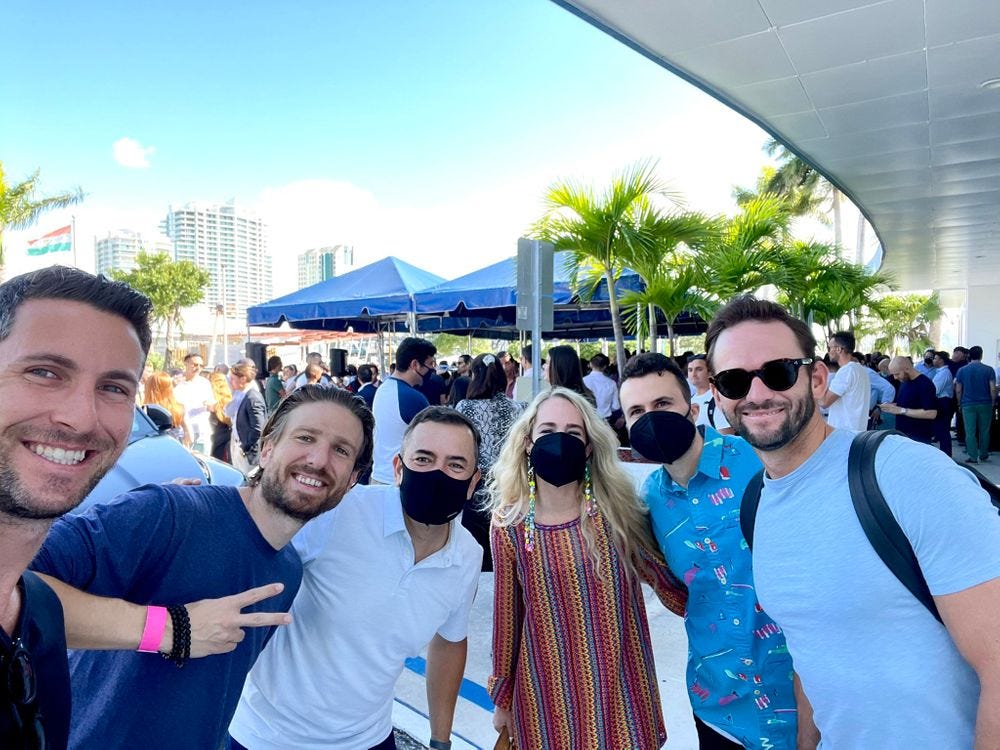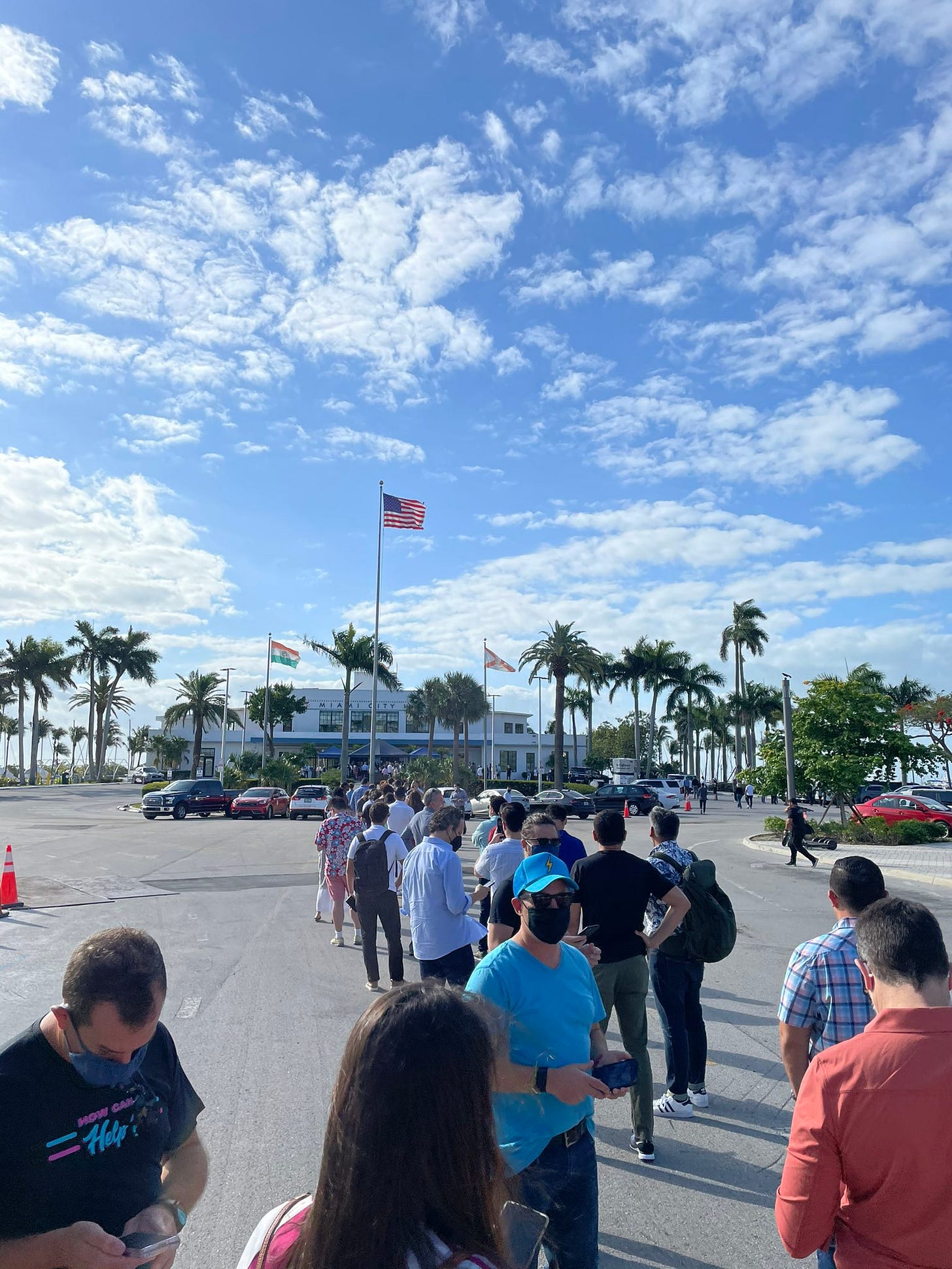The Start Of Startup Cities
Miami demonstrates that the era of startup cities is now underway.
Note: This post was originally created at 1729.com which has evolved into thenetworkstate.com.
In 2013 I wrote a piece on how Software was Reorganizing the World:
Today, the geocenter of the global technology cloud is still hovering over Silicon Valley. But in a world where technology is making location increasingly less important, tomorrow the reverse diaspora may well assemble somewhere else.
With Miami Tech Week, that moment has arrived. A critical mass of technologists just left San Francisco to alight for balmier climes. The movement that Miami Mayor Francis Suarez and Founders Fund Partner Keith Rabois began just a few months ago has achieved escape velocity. And the world has changed forever — because Miami is just the first of a new set of international cloud capitals and startup cities.
0. Miami, Specifically
First, let me preface everything I'm about to say by noting that I'm pro-Miami, pro-Francis-Suarez, pro-Rabois, pro-Miami Tech Week, and excited about all the long overdue tech investment in Latin America that will happen as a consequence of the Miami migration. After all, many Latin Americans understand crypto intuitively after enduring decades of currency crises. And longitudinal arbitrage is about to begin as companies and individuals recognize that in the remote economy they can enjoy Latin American climates while working in North American time zones.
The home base for that arbitrage will be Miami; it makes even more sense as an outpost for international technology when you realize that it's been the Singapore of Latin America for generations, the mutually trusted place where an Argentinean and Chilean can ink a deal for millions by availing themselves of internationally fluent attorneys and relatively stable banking. It's an entrepôt that has always welcomed entrepreneurs, it deserves its success, and it's a wonderful place to build technology.
With that said, the implications of Miami Tech Week are much bigger than Miami itself. Miami Tech Week shows that politicians have a new path to power, demonstrates a new way for citizens to exert influence over governance, proves that Silicon Valley has finally achieved its destiny of decentralization, and indicates that the era of startup cities is now underway.
1. CEO of the City
First, Miami demonstrates a new path to power for ambitious young politicians. Mayor Francis Suarez is now one of the most important mayors in the US, because he's presiding over one of the fastest prestige growths in the country by getting people to vote with their wallets and their feet, not just their ballots.
The prestige growth he's catalyzed may not show up in Miami's GDP or population numbers for a while, but it's the kind of energy you see in an early Clubhouse or Ethereum — and the kind you always bet on. What Suarez has tapped into is not just democracy, it's technology and capitalism and emigration as well — all of the fundamental forces, rather than just one by itself. He's the first American politician that's using social media not to dunk on half his constituents, but to grow the pie for all of them.
Suarez is the first of his kind, the first CEO of the city, and will be deservedly famous as a pioneer. His rise is just beginning. And he will inspire others, people from both parties, all parties, all countries, who realize they can buck the party machinery and the same tired debates by simply acting as if they were the chief executive of a bigger city and then willing it into being. If Miami pulls in the top technologists, creators, and investors from Silicon Valley, New York, and Los Angeles it can vault to the very top of the American landscape overnight. No need to politick and glad hand; American leaders can now build their constituencies by recruiting them personally.
So that's the first lesson of Miami Tech Week: to become chief executive of a larger jurisdiction, an ambitious politician no longer needs to win a bigger election. They can do it by winning internet selection.
2. Crowdchoice: The Digital Selection of a Physical Location
Second, Miami Tech Week is also an innovation for citizens, as it gives them a new way to collectively express their preferences through something we've called crowdchoice. We can and should formalize this in an app, but right now the way that Miami was chosen was as follows:
A few initial leaders on the ground appeared, like Rabois and Shervin
San Francisco collapsed further into a pit of misgovernance
Suarez put out the how-can-i-help signal, which was amplified widely
Meetups proceeded, online consensus was achieved, mass visitation occurred, and mass migration is likely to follow
In other words, Miami was put on the tech map by community leaders, and Miami Tech Week was the beta test of a physical location. Many of the people who came now have a collective understanding that Miami is a thing, and that it satisfies their preferences.
But Miami may not be for everyone. Some people may not have visas to enter the US. Some people aren't cut out for hot locales. Some people have to be near certain time zones for work. We can collect all these preferences in an app, find the jurisdictions that are already closest to those (aggregate) preferences, allow users to nominate a leader, have that leader negotiate with the sovereigns of those jurisdictions, and then execute collective migration if the negotiation is successful.

The process described is very similar to what happened after Miami-curious technologists spoke to Suarez about Bitcoin — he put the whitepaper on the Miami website, did public talks on Bitcoin, and drew in many more crypto aficionados to his city. Bitcoin was hoisted as the flag of technology, citizen preferences were satisfied outside election cycles, and economic migrants were drawn to the jurisdiction.
This is the concept of crowdchoice: the facilitation of influencer-mediated collective migration, voting with wallets and feet outside election cycles. Let people vote how they want, then move where you like — with your group. And that's the second lesson of Miami Tech Week: it is now feasible for crowds to execute digital selection of physical jurisdictions.
3. The Next Silicon Valley is in the Cloud
Third, Miami demonstrates that the tech diaspora is now fully mobile and can use the internet to coordinate a real-world migration. It's gratifying to see this happen, because for a decade I've been counseling digital exit from Silicon Valley, followed by physical exit and reassembly in a new location that's more friendly to technology. Here's a graphic from a piece that accompanied my 2013 talk on Silicon Valley's Ultimate Exit.
In the terminology of this chart, we can think of Miami Tech Week as a Cloud Gathering of thousands of people for a week, and the coming mass migration as a kind of embryonic Cloud City.
This kind of techxodus is feasible because we spent the last few decades uploading every aspect of Silicon Valley to the cloud. It's not just Gmails and iPhones and Facebooks and Ubers. All the cultural features have been digitized too. You don't need to be at Stanford to stream Coursera, don't need to be on Sand Hill to raise VC, don't need to be in San Francisco anymore to do enterprise sales. Indeed, during the pandemic you couldn't be in those places, so we learned to do everything virtually, and in doing so cut the last obligate ties to the land. That is the third lesson of Miami Tech Week: you no longer need to relocate to San Francisco to build an internet app. That irony of history was a transitional phase that is now at an end.
4. Startup Cities are the Cryptocurrencies of the 2020s
Fourth, Miami demonstrates that startup cities are now starting. There are three definitions of a startup city:
A city where startups happen, what San Francisco used to be prior to the current exodus.
A city that acts like a startup, like Miami or Dubai.
A city that is a startup itself, like Prospera, Culdesac, or Starbase, TX.
These definitions get progressively more ambitious. There's nothing illegal about starting a new city, it's just not thought of as something people do. But it's easier than ever before. All you need is a founding influencer and a bare piece of land. Identify a unique feature (like being vegan or car-free), design the city online, recruit a critical mass of people, then move there and build it de novo. And maybe issue a cryptocurrency to start giving an incentive for early adopters to build up their patch of earth — but do it in the form of a REIT so that they don't get too attached to a specific plot of non-fungible land, and instead have shares in the city as a whole.
Miami is just the start of the startup city trend. Technology is transforming Wyoming, where DAOs are now legal. And it's coming to Texas, where Elon is building Starbase and tech founders are helping to repair Austin. Emigrants, getting the job done — and making their voices felt in politics right away, just not in the form usually envisioned. Within the US it is now changing sub-federal governance, as technologists ally with laser-eyed mayors and senators, outside partisan politics, to build broad-based prosperity for all. Yet this too understates what's happening, because the trend is bigger than Miami, Texas, Wyoming, or even the US. It's about cloud capitals and startup cities arising around the world (see this excellent list).
For many years, international technologists have been aware of what's been happening in Silicon Valley, but often not vice versa. Now that is changing. In the remote economy, in the cryptoeconomy, in the Starlink economy, in the post-COVID economy, real estate is being repriced worldwide. Dense cities are less valuable and time zone colocation is more valuable. Asia is rising and traditional capitals are falling. It's not just about Miami or Austin anymore, but about Estonia, Singapore, Taiwan, Israel, Dubai, and New Zealand — and about Culdesac, Starbase, and Prospera.
And that's the fourth lesson of Miami Tech Week: startup cities are now feasible because the market for cities is now manifest. The overnight collapse of Silicon Valley, California as the undisputed tech capital means that cities are suddenly just as subject to competitive pressure as tech companies and national currencies. You migrate to a startup city — or invest in one — because it can now outcompete long-entrenched incumbents by pursuing the policies they reject, the capital they rebuff, and the talent they refuse. When Silicon Valley didn't innovate, the people who built Silicon Valley began building alternatives to Silicon Valley itself.
✅ Task: Earn $100 in BTC
Write a post or set up a microsite on startup cities
The startup cities trend has been bubbling for the last decade and is now underway. Write a post on the rise of startup cities, like this one, which either goes into depth on a single locale or surveys the space as a whole. Don't be afraid to get creative — it can be an index of startup cities or a microsite, not just an essay. We'll pay the best submissions $100 each in BTC and put them on social media. Good resources include Remote Work and the Tech-Enabled Exit, Charter Cities Blog, and the Pronomos Knowledge Base.
🏆 Winners: Best Posts
The following ten submissions received $100 in BTC for their posts on the rise of startup cities. Read one below!













